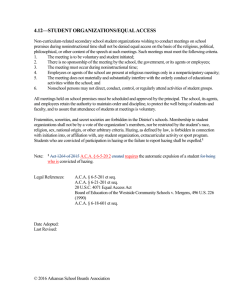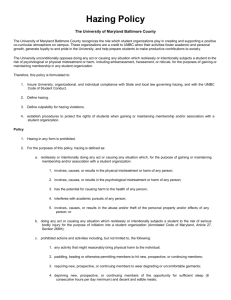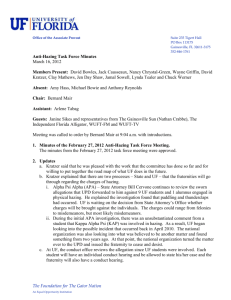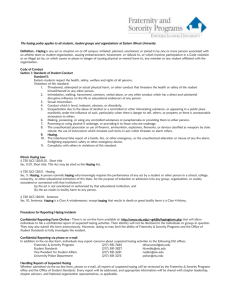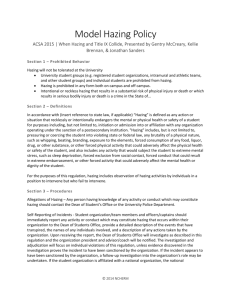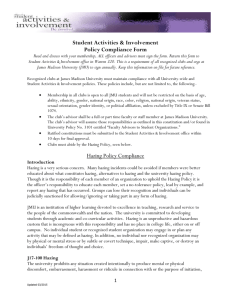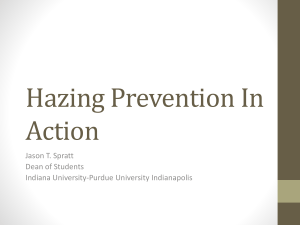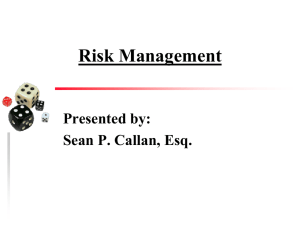Get a Clue.. Hazing Has No Place in Life
advertisement
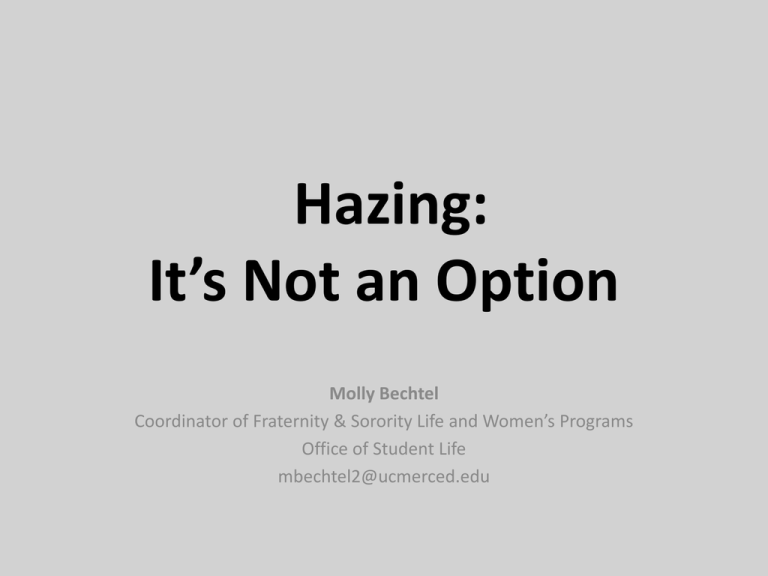
Hazing: It’s Not an Option Molly Bechtel Coordinator of Fraternity & Sorority Life and Women’s Programs Office of Student Life mbechtel2@ucmerced.edu Goals for Today’s Presentation • Define “hazing.” • Explore hazing myths and understand the facts. • Understand the relationship between hazing and consent. • Identify ways to prevent hazing and take action. Basic Goals of an Education Program • • • • New/Prospective members get to know the other prospective members New/Prospective members get to know the initiated members New/Prospective members get to know how the chapter operates New/Prospective members get to know how to navigate the campus Non-Goals of an Education Program • • • • • • To “mold” prospective members To make them “ready” To “earn” brotherhood/sisterhood To have janitors To have telephone receptionists To “build better” new/prospective members • To know their stuff Hazing, Defined by the UC “Participation in hazing or any method of initiation or pre-initiation into a campus organization or other activity engaged in by the organization or members of the organization at any time that causes, or is likely to cause, physical injury or personal degradation or disgrace resulting in psychological harm to any student or other person.” (UC Student Code of Conduct, 102.12) Hazing, Defined by the State of CA “‘Hazing’ or ‘haze’ is conduct which causes, or is likely to cause, bodily danger, physical harm, or personal degradation or disgrace resulting in physical or mental harm to another person in the course of the other person’s pre-initiation into, initiation into, affiliation with, holding office in, or maintaining membership in any organization.” (California Penal Code, Section 245.6) Ask Yourself… • Would you conduct this activity if your parents and/or members of the inter/national board were present? • Will any member of the group refuse to participate? • Is the purpose to exclude or punish? • Will the activity involve emotional or physical abuse? • Does this activity violate any value statement set forth by the organization? • Would you openly invite the media to attend this event, take photos and film your event for the evening news? Is It OK To…? Require new/prospective members to carry $5.00 with them at all times. Mislead new/prospective members about ceremonies or ritual with the excuse that it will be a surprise. Ask new/prospective members to recite the names and hometowns of other members. Require new/prospective members to keep the fact that they are pledging or participating in a new/prospective member education process a secret. Wake up new/prospective members in the middle of the night and ask them to go on a milkshake run. Not allow new/prospective members to wear the organization’s colors or insignia before initiation. Organize a scavenger hunt to lead new/prospective members to a fun party in their honor. Kidnap new/prospective members and take them to an amusement park for the day. Keep the date of Initiation secret. Physically, verbally or sexually harass someone. The answer to all these questions is… NO. Hazing Myths Myth #1 Everyone does it. Myth #2 Hazing is just good, clean fun – nobody suffers from it. Myth #3 As long as there's no harmful intent, a little hazing should be okay. Myth #4 Hazing motivates members, shows them how valuable their membership is and teaches respect. Examples of Hazing • • • • • • • Blindfolding for any purpose. Creation of excessive fatigue or hunger. Physical or psychological shocks. Treasure hunts. Scavenger hunts. Kidnaps of any kind. Wearing apparel which is conspicuous and not in normally good taste. • Engaging in stunts. • Degrading or humiliating games and activities. • Late work sessions. Hazing & Consent • “If you don’t want to do this, you can leave.” • “We wanted to do it and they weren’t forcing us, so it wasn’t hazing.” The fact that an activity is done with the consent of the persons involved does NOT exempt it from being hazing. There is no gray zone in hazing. Hazing is an action, not a degree of action. YOU What can do to Prevent Hazing • Speak out against it. • Talk about it with your advisers and/or inter/national board if you need guidance or help. • Report hazing violations to your college or university’s administrative officers. • Simply refuse to be a part of it…don’t haze or be hazed. Resources & Contacts • Office of Student Life & Student Judicial Affairs studentlife@ucmerced.edu 209-228-5433 (209-CAT-LIFE) • UC Merced Police Department police@ucmerced.edu 209-228-2677 (209-CAT-COPS) • Anti-Hazing Hotline 888-688-4293 (888-NOT-HAZE) Questions?
